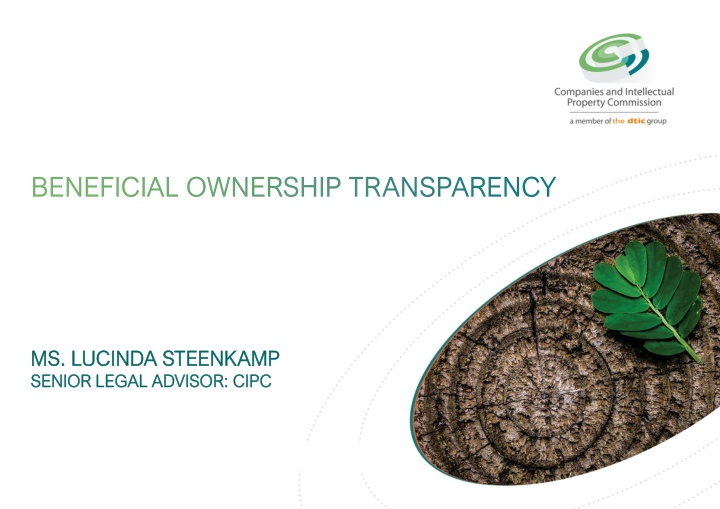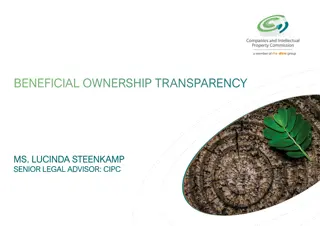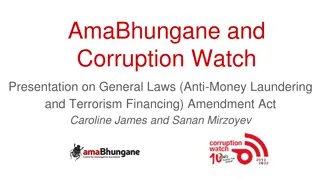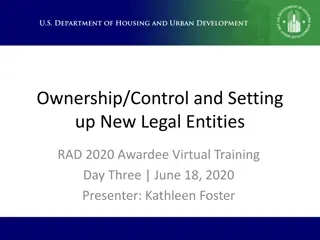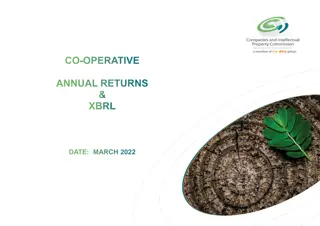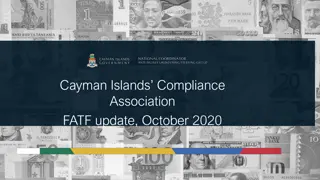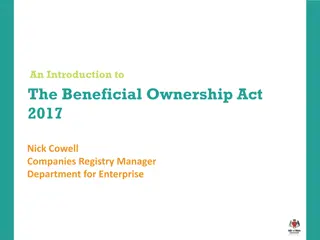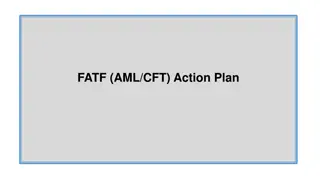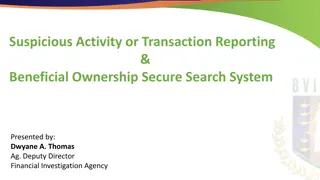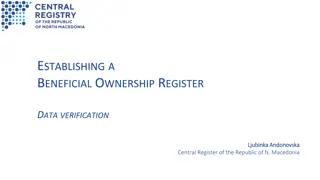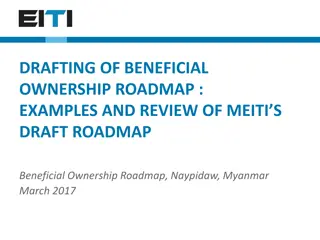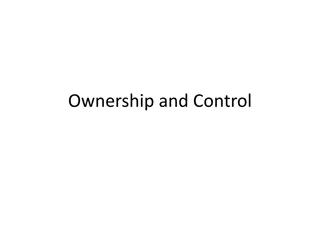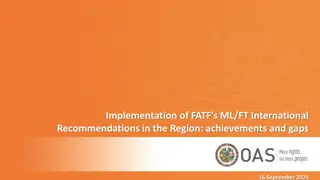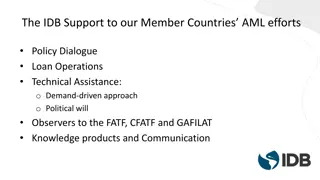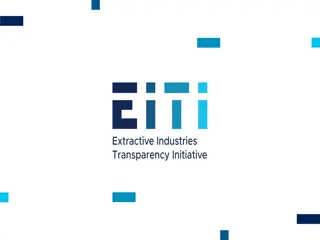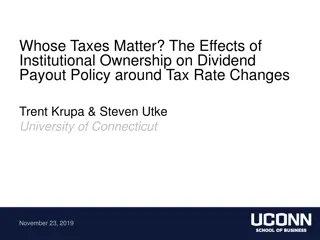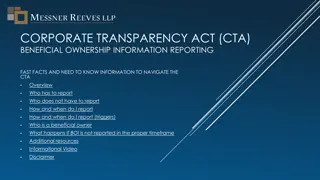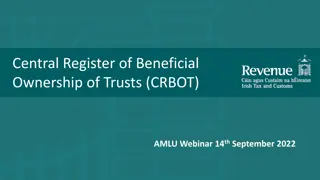Enhancing Beneficial Ownership Transparency: CIPC's Response to FATF Requirements
The Companies and Intellectual Property Commission (CIPC) in South Africa has taken significant steps to address deficiencies highlighted by the Financial Action Task Force (FATF) by establishing a Beneficial Ownership Register. Through this register, CIPC aims to collect accurate information on beneficial ownership status, promoting transparency and combating financial crimes like money laundering. With successful filings and actions to ensure compliance, CIPC is actively working towards meeting FATF standards.
Download Presentation

Please find below an Image/Link to download the presentation.
The content on the website is provided AS IS for your information and personal use only. It may not be sold, licensed, or shared on other websites without obtaining consent from the author.If you encounter any issues during the download, it is possible that the publisher has removed the file from their server.
You are allowed to download the files provided on this website for personal or commercial use, subject to the condition that they are used lawfully. All files are the property of their respective owners.
The content on the website is provided AS IS for your information and personal use only. It may not be sold, licensed, or shared on other websites without obtaining consent from the author.
E N D
Presentation Transcript
BENEFICIAL OWNERSHIP TRANSPARENCY BENEFICIAL OWNERSHIP TRANSPARENCY MS. LUCINDA STEENKAMP MS. LUCINDA STEENKAMP SENIOR LEGAL ADVISOR: CIPC SENIOR LEGAL ADVISOR: CIPC
ROLE OF CIPC The CIPC is the Regulator in terms of the Companies Act, 71 of 2008 (as amended) read with the applicable Regulations. As the Regulator, the CIPC has, inter alia a responsibility to educate on and promote voluntary compliance, monitor compliance, investigate non-compliance contravention of the Companies Act (and other legislation), as well as enforce compliance. and/or any The General Laws Amendment Act, 22 of 2022, written into law in December 2022, amended the Companies Act to mandate CIPC to establish a Beneficial Ownership Register and to collect information regarding corporate vehicles beneficial ownership status. Companies Act Regulations Amendment was promulgated on 24 May 2023 (GG Notice 48648), which provides legal backing to the requirements of the GLAA and the subsequent Companies Act amendment.
RESPONSE TO FINANCIAL ACTION TASK FORCE (FATF) On 24 February 2023, South Africa was put on a FATF Grey List which means that South Africa is placed under increased monitoring, while the country has committed to resolve identified strategic deficiencies establishment of the BO-register addresses one of the FATF identified deficiencies. CIPC had to respond to the following, after an action plan was issued, viz. ensure that competent authorities have timely access to accurate and up-to-date Beneficial Ownership (BO) information on legal persons and arrangements, and apply sanctions for breaches of violations by legal persons to BO obligations;
CIPC RESPONSE TO FATF REPORT CIPC released the Beneficial Ownership Register functionality on its e-services platform on 1 April 2023 and to date we have received 617 successful filings (completed) of BO information. The main purpose of BOT (beneficial ownership transparency) is to assist law enforcement in the fight against money laundering and financing of terror activities. The functionality provides for corporate vehicles (companies and close corporations) to submit with the CIPC details regarding its beneficial ownership status (5% and above) in terms of mentioned corporate vehicles. Failure to submit the required information is tantamount to non- compliance of the Companies Act, which could result in court ordered administrative fines sanctions.
CIPC REPORT IN ADDRESSING THE INEFFICIENCIES (CONT) Recommendation 4 Actions (data sharing) CIPC has MoU s with most law enforcement agencies for direct access to the CIPC database to aid in the investigation processes and as part of the annual report we report on such statistics of usage. There are officers within CIPC (disclosure division) dedicated to assisting law enforcement with affidavits and provision of corporate information/ certified copies/ originals for court purposes and / or appearing as experts for matters being prosecuted in court. With the establishment of the BO register, access will continue to be timely, virtual and direct for LEAs.
WHAT IS BENEFICIAL OWNERSHIP? beneficialowner in respect of a company, means an individual who, directly or indirectly, ultimately owns that company or exercises effective control of that company, including through- (a) the holding of beneficial interests in the securities; (b) the exercise of, or control of the exercise of voting rights; (c) the right, or control of the right to appoint and remove directors; The ability to exercise control, through a chain of ownership, of- A juristic person other than a holding company of that company; A body of persons corporate or unincorporate (i.e. body corporate of an estate NPC); A person acting on behalf of a partnership; A person acting in pursuance of a trust or agreement (i.e. trustees, beneficiaries of trusts, beneficiaries of an agreement);
WHAT IS BENEFICIAL OWNERSHIP? (a) the ability to otherwise materially influence the management of the company. State owned companies (SOC s) will also be required to file BO information, unless exempted by the Minister in terms of section 9(2) of the Companies Act.
WHAT IS AN AFFECTED COMPANY? affected company means a regulated company as set out in section 117(1)(i) which in turn refers to a company to which this Part, Part C (regulation of affected transactions and offers) and the Takeover Regulations apply, as determined in accordance with section 118(1) and (2) An affected company therefore includes- A public company (listed/un-listed); A state-owned company (except in case of exemption by Minister); A private company in terms of the transfer of securities when exceeding the percentage prescribed by the Minister (10%) within a 24-month period; A private company that is controlled by an affected company (regulated company) or is a subsidiary of an affected company.
THE DIFFERENCE BETWEEN A LEGAL AND BENEFICIAL OWNER - EXAMPLES Shareholding a registered owner of shares directly with a company, the information is known and clearly indicated on company records (securities register). A beneficial owner is a person (warm body) that holds shares indirectly, for example through a bank, broker, etc. Property the legal owner of a property would be the person who s name is indicated on the title deed of the property (known, registered information). Whereas the beneficial owner of property would be the person who benefits from the property. Trusts trustees act as legal owners of the assets held in trust (when a trust owns a property for example) and also makes all the management decisions, whilst the beneficiaries in fact benefits from the trust assets (rental income; living on the property, rent free).
THE DIFFERENCE BETWEEN A LEGAL AND BENEFICIAL OWNER - EXAMPLES Voting rights a person may not necessarily be indicated as a shareholder of a company (not in the securities register), but has specific voting rights related to an asset the company holds, thus not a shareholder, but a beneficial owner through its significant control in terms of the company, and possible benefit in the property. Significant control person may not be indicated as legal or beneficial owner (shareholder, voting rights, etc.) but holds the ability to appoint or remove directors of a company section 66(4) of the Companies Act. The ability to materially influence the board of directors structure of any company is regarded as significant control and thus beneficial owner.
BENEFICIAL OWNERSHIP REGISTER The submission of beneficial ownership information is done through a fully automated functionality, to be updated as and when the information changes, but not less than once annually. Entities incorporated before 24 May 2023, must file the required information within 30 days from its incorporation anniversary date (FYE). Entities incorporated after 24 May 2023, must file their BO-information within 10 (ten) days of incorporation, as applicable. The register functionality can be found on the e-services platform. Any person can file BO information on behalf of a legal person, provided that a written mandate is in place for such filing. The mandate forms part of the compulsory supporting documents that must be filed.
BENEFICIAL OWNERSHIP REGISTER The disclosure of this register is anticipated to be an online (automated) process, in line with the existing disclosure process, with the caveat that requestors of this information will be vetted and verified as LEA s and regulatory bodies / accredited authorities. The beneficial ownership register will not be available to the public. The aim of the BO-register is to have a repository / register of natural persons who own or exercise control over legal entities and to assist law enforcement internationally) with relevant information when it comes to the investigation of the ultimate owners of entities. (both nationally and
SUMMARY AND CONCLUSION Establishment of the BO-Register and the collection of credible, up to date and accurate information remains a CIPC priority, together with the establishment of a functional portal for the disclosure of this information. Will be a fully Virtual Functionality requests for and delivery of information, done electronically and through automated systems. Verification capability of submitted information triangulation with other Regulators, and authorized bodies credible and accurate Register. Cross-border information sharing LEA s
SUMMARY AND CONCLUSION Investigation Powers, Summoning Powers, Compliance Notices Companies Act non-compliance and/or contravention of the Companies Act legislative sanctions. Disclosure of Information (in line with POPIA) Law Enforcement and regulatory bodies / authorities only
CHANGE MANAGEMENT (LINKS) https://www.cipc.co.za/wp-content/uploads/2023/05/USER- GUIDELINES-BO-LEGISLATIVE-REQUIREMENTS.pdf https://www.cipc.co.za/wp- content/uploads/2023/05/Beneficial-Owner-Filing- Requirements-Guidance-Notice-25_May-2023.pdf https://www.cipc.co.za/wp- content/uploads/2023/05/Companies-amendment-regulations- 2023.pdf https://www.cipc.co.za/?page_id=4160 (BO FAQ s)
THANK YOU QUESTIONS WELCOME!
